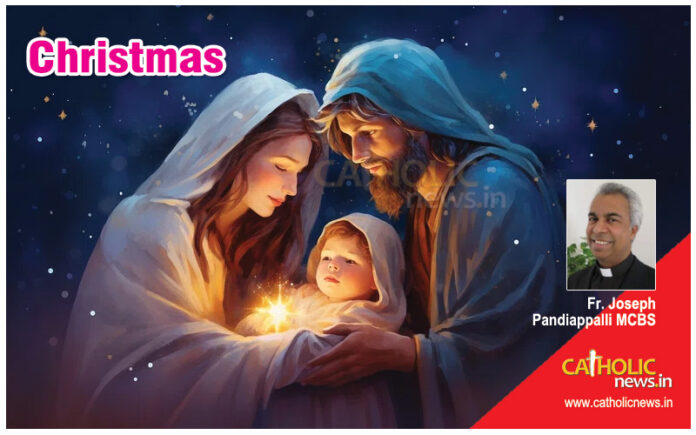
Every year on Christmas Day we hear from the first chapter of the Gospel of John verses 1-18, which we call the Prologue of John. In the prologue, John describes God’s incarnation philosophically in the background of the creation story from the Book of Genesis of the Old Testament.
When John says, “All things came into being through the Word, and without the Word nothing came into being,” John is not actually saying anything new, because in the first chapter of the book of Genesis it says: “God spoke, and there was light. Before every creation we read there the expression: “God spoke”. The events described in the book of Genesis with the words: “God spoke,” explains the evangelist John in his own words like a poem, saying: “Everything came into being through the Word and without the Word nothing came into being.”
John calls the Creator of the world „Word“. For John, the concepts God and Word are almost identical. John calls God’s creation as the creation through the Word. In this sense, the use of language in Genesis and in Prologue of John is similar.
But in the prologue of John there is a great difference in thought and expression. This difference lies in the development and expansion of the description of the creation story of the book of Genesis. In the book of Genesis the Word is described as God as Creator. John uses the term Word to refer to Jesus Christ. Jesus is presented as the Word incarnate.
A second difference lies in the use of the terms light and flesh and in the understanding of these two terms. In the creation story, light was the first gift of creation. But John speaks about the coming of a second light into the world, the true light that shines on every person, Jesus Christ. The light in the creation story and the light in the prologue to John are not identical, but at least similar in function. The light shines. Jesus Christ as the true light really shines and gives insights.
That’s why everyone who receives this true light receives the gift of becoming light themselves and also becoming children of God.
In the creation story of the book of Genesis, the final gifts of creation, living creatures and man, are in flesh and blood. The first Word made flesh and blood is the living creature, specifically the first humans, Adam and Eve. But John says that the true incarnate creation is Jesus Christ.
Here also the first man who became flesh and blood is not identical with the true incarnate Word who dwelt among us. Paul calls the first man the first Adam and the second man he calls the second Adam, who is Christ.
John describes in the prologue that Jesus as Word is the creator of the world, Jesus is the true light and is true God incarnate. John confesses that Jesus is simultaneously the Creator of the world and the perfect creation. He doesn’t tell us a scientific theory, but rather his own reflection in the background of Jewish tradition and Greek philosophy.
The aim of the evangelist John was to preach Christ and to persuade philosophers and scientists to know about Christ. But we are Christians who believe in Jesus and worship him. For us he is Word and God, flesh and man. He is our light, our way, our door, our truth. For us, his birthday is a day of solemnity that we celebrate as a celebration of human relationships. Word and light, flesh and blood are expressed in our encounters. We experience the humanity, the human feelings and the human care that we experienced in Jesus Christ through his words and deeds every year in the Christmas celebration.
If we call the incarnation of God the incarnation of the Word and Jesus the true light, I wish for all of us appropriate words in every situation and the light of the Word in every dark night of life. Merry, joyful Christmas days.
Fr. Joseph Pandiappallil MCBS



